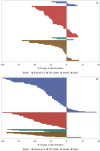Clinical Prediction Models for Valvular Heart Disease
- PMID: 31583938
- PMCID: PMC6818049
- DOI: 10.1161/JAHA.119.011972
Clinical Prediction Models for Valvular Heart Disease
Abstract
Background While many clinical prediction models (CPMs) exist to guide valvular heart disease treatment decisions, the relative performance of these CPMs is largely unknown. We systematically describe the CPMs available for patients with valvular heart disease with specific attention to performance in external validations. Methods and Results A systematic review identified 49 CPMs for patients with valvular heart disease treated with surgery (n=34), percutaneous interventions (n=12), or no intervention (n=3). There were 204 external validations of these CPMs. Only 35 (71%) CPMs have been externally validated. Sixty-five percent (n=133) of the external validations were performed on distantly related populations. There was substantial heterogeneity in model performance and a median percentage change in discrimination of -27.1% (interquartile range, -49.4%--5.7%). Nearly two-thirds of validations (n=129) demonstrate at least a 10% relative decline in discrimination. Discriminatory performance of EuroSCORE II and Society of Thoracic Surgeons (2009) models (accounting for 73% of external validations) varied widely: EuroSCORE II validation c-statistic range 0.50 to 0.95; Society of Thoracic Surgeons (2009) Models validation c-statistic range 0.50 to 0.86. These models performed well when tested on related populations (median related validation c-statistics: EuroSCORE II, 0.82 [0.76, 0.85]; Society of Thoracic Surgeons [2009], 0.72 [0.67, 0.79]). There remain few (n=9) external validations of transcatheter aortic valve replacement CPMs. Conclusions Many CPMs for patients with valvular heart disease have never been externally validated and isolated external validations appear insufficient to assess the trustworthiness of predictions. For surgical valve interventions, there are existing predictive models that perform reasonably well on related populations. For transcatheter aortic valve replacement (CPMs additional external validations are needed to broadly understand the trustworthiness of predictions.
Keywords: clinical prediction models; risk; valvular heart disease.
Figures


References
-
- Leon MB, Smith CR, Mack M, Miller DC, Moses JW, Svensson LG, Tuzcu EM, Webb JG, Fontana GP, Makkar RR, Brown DL, Block PC, Guyton RA, Pichard AD, Bavaria JE, Herrmann HC, Douglas PS, Petersen JL, Akin JJ, Anderson WN, Wang D, Pocock S; PARTNER Trial Investigators . Transcatheter aortic‐valve implantation for aortic stenosis in patients who cannot undergo surgery. N Engl J Med. 2010;363:1597–1607. - PubMed
-
- Muller DWM, Farivar RS, Jansz P, Bae R, Walters D, Clarke A, Grayburn PA, Stoler RC, Dahle G, Rein KA, Shaw M, Scalia GM, Guerrero M, Pearson P, Kapadia S, Gillinov M, Pichard A, Corso P, Popma J, Chuang M, Blanke P, Leipsic J, Sorajja P; Tendyne Global Feasibility Trial Investigators . Transcatheter mitral valve replacement for patients with symptomatic mitral regurgitation: a global feasibility trial. J Am Coll Cardiol. 2017;69:381–391. - PubMed
-
- Aboulhosn J, Cabalka AK, Levi DS, Himbert D, Testa L, Latib A, Makkar RR, Boudjemline Y, Kim DW, Kefer J, Bleiziffer S, Kerst G, Dvir D, McElhinney DB. Transcatheter valve‐in‐ring implantation for the treatment of residual or recurrent tricuspid valve dysfunction after prior surgical repair. JACC Cardiovasc Interv. 2017;10:53–63. - PubMed
-
- Holmes DR Jr, Mack MJ, Kaul S, Agnihotri A, Alexander KP, Bailey SR, Calhoon JH, Carabello BA, Desai MY, Edwards FH, Francis GS, Gardner TJ, Kappetein AP, Linderbaum JA, Mukherjee C, Mukherjee D, Otto CM, Ruiz CE, Sacco RL, Smith D, Thomas JD. 2012 ACCF/AATS/SCAI/STS expert consensus document on transcatheter aortic valve replacement. J Am Coll Cardiol. 2012;59:1200–1254. - PubMed
-
- Nishimura RA, Otto CM, Bonow RO, Carabello BA, Erwin JP III, Fleisher LA, Jneid H, Mack MJ, McLeod CJ, O'Gara PT, Rigolin VH, Sundt TM III, Thompson A. 2017 AHA/ACC focused update of the 2014 AHA/ACC guideline for the management of patients with valvular heart disease: a report of the American College of Cardiology/American Heart Association task force on clinical practice guidelines. Circulation. 2017;135:e1159–e1195. - PubMed
